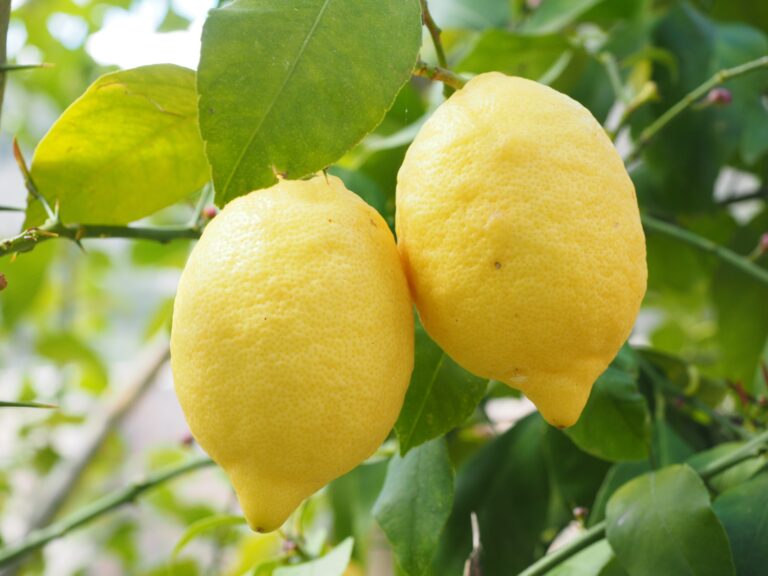Flies On Lemon Tree (Causes, Getting Rid, And Prevention)
What Causes Flies On Lemon Tree?
Flies on lemon trees can be caused by a variety of factors, including poor sanitation, inadequate air circulation, and excess moisture. Overripe or fallen fruits, as well as decaying leaves and branches, attract flies that feed and breed in these environments.
Poor air circulation, often due to overcrowding or dense foliage, can create a conducive habitat for flies to thrive. Excess moisture, especially when combined with warm temperatures, also encourages flies to infest lemon trees. Furthermore, a lack of natural predators, such as birds and beneficial insects, can lead to an increase in the fly population around lemon trees.
How To Get Rid Of Flies On Lemon Tree?
Getting rid of flies on lemon trees can be done through a combination of preventative measures and targeted treatments. Start by pruning and disposing of any dead or diseased leaves and branches, as these can attract flies. Introduce beneficial insects, such as ladybugs and lacewings, which are natural predators of flies and other pests.
Use insecticidal soaps, horticultural oils, or neem oil to combat fly infestations directly; make sure to follow the product instructions for the best results. Sticky traps can also be placed around the lemon tree to catch adult flies. Additionally, maintain good sanitation around the tree, by cleaning up fallen fruits and debris regularly, to deter flies from breeding.
How To Prevent Flies On Lemon Tree?
Preventing flies on lemon trees involves proper tree care and regular maintenance. Ensure that the lemon tree receives adequate sunlight, water, and nutrients for optimal growth. Prune the tree regularly to maintain good air circulation and remove dead or diseased leaves and branches.
Clean up fallen fruits, leaves, and debris to minimize potential breeding sites for flies. Encourage the presence of natural predators, such as birds and beneficial insects, by providing nesting sites and planting insectary plants. Monitor the lemon tree regularly for early signs of fly infestations, and take prompt action if any are detected.
What Are The Natural Remedies To Control Flies On Lemon Tree?
Natural remedies to control flies on lemon trees include introducing beneficial insects, utilizing homemade insecticidal sprays, and employing physical barriers. Encourage the presence of natural predators like ladybugs, lacewings, and parasitic wasps, which feed on flies and their larvae.
Create a homemade insecticidal spray using water, mild dish soap, and a small amount of cayenne pepper or garlic; apply this solution to the affected areas of the tree. Physical barriers, such as floating row covers or insect netting, can also be used to keep flies away from the lemon tree. Additionally, consider companion planting with strong-smelling herbs like basil or marigolds, which can help repel flies and other pests.
Can Vinegar Help To Get Rid Of Flies On Lemon Tree?
Vinegar can help to get rid of flies on lemon trees, particularly when used as a trap. Apple cider vinegar is especially effective, as it emits a sweet aroma that attracts flies. To make a vinegar fly trap, mix equal parts of apple cider vinegar and water in a small container.
Add a few drops of dish soap to break the surface tension, ensuring that flies cannot escape once they land on the solution. Place the container near the lemon tree, making sure it is not touching the tree itself. Replace the solution regularly to maintain its effectiveness.
While vinegar traps can help control adult flies, it is important to use this method in conjunction with other preventative measures and treatments for a comprehensive approach to managing fly infestations.
How To Make A Homemade Fly Trap For Lemon Tree?
To make a homemade fly trap for a lemon tree, start by cutting the top off a plastic bottle, leaving about two-thirds of the bottle intact. Invert the top section and insert it into the bottom section, creating a funnel-like opening. Secure the two sections together with tape.
Fill the bottom section with an attractant, such as a mixture of apple cider vinegar, water, and a few drops of dish soap. The vinegar will attract the flies, while the dish soap breaks the surface tension, trapping the flies in the solution. Hang or place the trap near the lemon tree, ensuring it does not come into direct contact with the tree. Empty and refill the trap regularly to maintain its effectiveness.
How To Treat A Lemon Tree Affected By Flies?
To treat a lemon tree affected by flies, begin by removing and disposing of any infested leaves, fruit, or branches. Apply insecticidal soap, horticultural oil, or neem oil to the affected areas of the tree, following the product instructions for proper application and frequency.
Introduce beneficial insects, such as ladybugs and lacewings, to help control the fly population. Use sticky traps to capture adult flies, and consider using a vinegar trap to help reduce the number of flies around the tree. Maintain good tree care practices, such as proper watering, fertilization, and pruning, to help the tree recover from the infestation.
What Are The Common Pests That Attack Lemon Trees?
Lemon trees can be attacked by various pests, including aphids, scale insects, spider mites, whiteflies, leaf miners, mealybugs, and citrus thrips. Aphids, scale insects, and mealybugs feed on plant sap, leading to curled, yellowed, or distorted leaves. Spider mites cause stippling or a fine, yellow speckling on leaves, and may produce fine webs.
Whiteflies also feed on plant sap, and their honeydew secretion can lead to sooty mold growth. Leaf miners create distinctive, winding trails on the leaves, while citrus thrips cause scarring and deformation of fruit. Proper tree care and regular monitoring can help prevent and manage infestations of these common pests.


